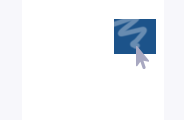Technical specification of ad formats
Rectangle Scratcher(300x250)

Due to its location, WideSquare is a very prominent and popular ad format. You won't miss it on the homepage or in the article. In this case, it has the attractive appearance of a scratch card. Moving the cursor over the banner reveals the second layer.
TECHNICAL SPECIFICATION
Format
- 2x Image (JPG, PNG) (for upper wiped layer and lower layer)
Dimension
- 300×250 px
Maximum data size
- 200 kB (for both images together)
External display code
- No
External measurements (beyond Mafra a.s. measurements)
- Yes, according to our specifications.
- Accepted third-party codes: AdForm, DCM, Sizmek, Gemius.
Attention! All third-party tracking codes must use only secure links (https://). In the creatives themselves, all tracking URLs must also use a secure connection (https://). Differences in tracking code statistics without using https:// will not be taken into account.
Due to the smooth running and running of campaigns, documents delivered outside the described specification must be approved in advance by the MAFRA Technical Department. Thanks for your understanding.
Before you start creating a banner
Image formats for ad banners:
- JPEG: Good for photos. Doesn’t support transparency. It uses lossy compression, which doesn’t like hatching and fields of red color. Tends to make blocks of 8x8 pixels. Data size is more dependent on image dimensions then image complexity.
- PNG: It fits on logos, texts, and uniform color elements. Supports transparency. Compression is lossless. The color palette can be reduced to 256 (and less) colors, and thus significantly reduce data size. Data size depends on image complexity and specifically on the number of used colors, not so much on image dimensions.
- SVF: Its a vector format so its ideal for logos, texts, icons, and other vector graphics. It's losslessly scalable but more complex vectors can be data-intensive.
- GIF: Fits only for animated graphic. Dat size is color dependent. For static image considering data and size is PNG always better.
General rules for all banners:
- The banner must not be overly aggressive in the sense of vibrating and flashing – an aggressive banner refers to a design that changes colors, headings or other important graphic elements in a striking manner and very short time span (less than 1 second), which can disturb the user when working with the page.
- The banner must not contain vulgarisms or other unethical elements.
- The banner must not exceed the permitted data limits and must have the correct dimensions for the required position.
- The banner must not contain control components of operating systems and must not look like a system report. Must not use generally known graphic elements in a misleading way – for example symbol “play” for anything else than the start of playing multimedia content and so on.
- The banner must in no way interfere with the page or influence the be-havior of page elements which are not a part of the advertising surfaces (banner). It must not change the page title or its main content, or arbitrarily adjust the entered URL without clicking on the banner.
- In file names must not be used any diacritical mark, space or any spe-cial character. Instead of space, you can use “_”.
- All versions of the banner and target URL addresses must be submitted at least two business days before the start of the campaign, if not stated otherwise.
General specification of HTML5 format:
- Banner is placed as an independent page in iframe thereby the risk of technical or visual collisions with other page elements is eliminated. If needed to be without iframe, then must be delivered more ahead for inspection by our specialist to prevent any collision.
- The banner must not cause any troubles in any browser, nor cause JS errors nor write anything to browser console.
- All data for the banner (including external sources, e.g. font from Google Fonts) must not exceed 100 kB limit.
- Hereby is excluded the use of tools like Adobe Edge or Swiffy etc. whose supporting JS libraries are bigger than data limit. The same applies to the use of various JS frameworks (YUI, MooTools, Prototype.js, jQuery etc.) and CSS frameworks (Bootstrap, Foundation, etc.).
- A banner must not overload the CPU; a computer with CPU Intel Core 2 (1,86 GHz) and tablet iPad 2 serves as a reference.
- CSS and JS should be within HTML file.
- The whole area for click must be in < a > element with attribute href (not onclick). URL will be set by our ad serving system.
- Redirection or any other change of URL within iframe which causes browser button not to go to the previous page is forbidden.
- Click-able parts of banner must have standard cursor of hand for links. Unclick-able parts must not have hand cursor.
- The banner must not steal focus or cause page exit without the standard and explicit action of the user (mouse click, finger tap, the press of the enter key).
- Any sound produced by banner without explicit user action is forbidden.
- Some of the users are having different font size set. So bare this in mind when coding.
For secure pages (https://) must all third-party measuring and display codes use only https://. In banner must all other calls and tracking URLs also use secured connection (https://). Only part, which need not be SSL compliant is URL clickthru. Differences in tracking code statistics without https:// will not be taken into account.
